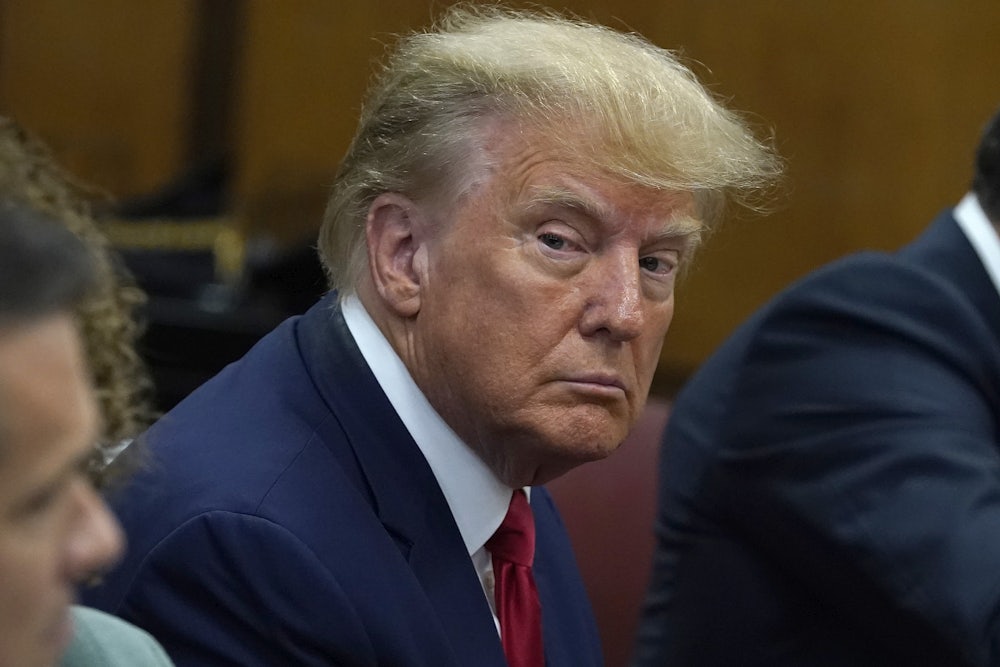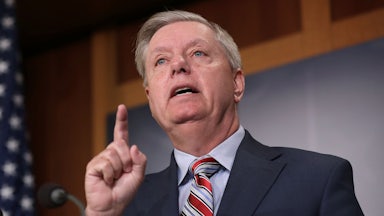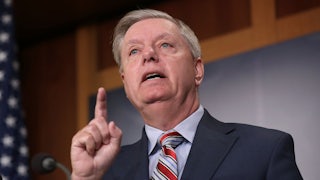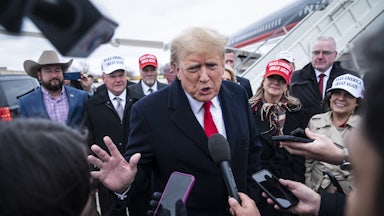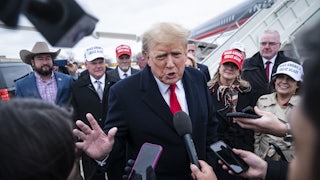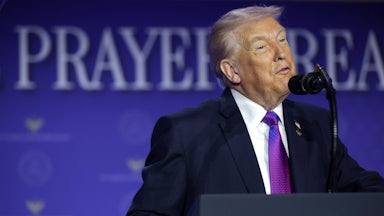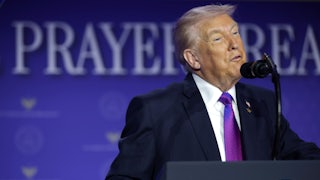There’s a lot we still don’t know about the fallout of the charges Donald Trump faces in the Stormy Daniels hush-money case he turned himself in for Tuesday. But thanks to a new poll, we’re starting to get hints about one of the biggest open questions in this case: what the long-term polling ramifications will be for Donald Trump, the Republican primary field, or the American electorate as a whole. And those hints are, well, weird.
On Monday morning, CNN published polling showing majorities not only approve of Trump being indicted over the alleged hush-money payments but also think the indictment was to some degree or in some way motivated by politics. Specifically, the poll found that a net 60 percent approve of the indictment, with 37 percent strongly approving and 23 percent “somewhat” approving. A net 40 percent said they disapproved of the indictment, the poll found, with the plurality falling into the “strongly disapprove” category. The poll also found that a net 76 percent of those surveyed said politics played a role in the indictment, with 52 percent saying it played a “major role,” 23 percent saying it played a “minor role,” and just 14 percent saying politics played “no role at all.”
Some of these findings have been a consequence of Trump painting his indictment as a “witch hunt” led by Manhattan District Attorney Alvin Bragg. Trump’s argument is that Bragg is just the latest shill to come after him to try and prevent his return to the White House. His supporters feel the same way.
But the poll’s findings indicate that it’s more than just hard-core Trump supporters who see the indictment as political: While 94 percent of those surveyed who lean Republican said politics played a role, a surprising 61 percent leaning Democratic said the same. And yet a majority support the indictment. The findings in CNN’s polling don’t seem to be an outlier. An ABC News/Ipsos poll also found that a plurality of Americans think Trump should be charged.
“I think the numbers illustrate complicated feelings … even people who support him have about him,” said Democratic strategist Karen Finney. “In those numbers it’s definitely a large number of Democrats and independents, but it’s also more Republicans than I would’ve expected.”
Voters oftentimes don’t get enough credit for being able to hold two opinions at the same time. But support for Trump’s indictment under the cloud of some kind of political motivation suggests they can.
Ideally, political motivation and actions by the American judicial system are supposed to stay as far apart as possible. But increasingly, politics and the law are seen as intertwined. Last year a Pew Research survey found that a growing number of Americans (which Pew made sure to specify is “driven by Democrats”) felt the U.S. Supreme Court had become too powerful. And that same poll found that just more than half of all Democrats surveyed (51 percent) felt that Supreme Court justices were inadequately separating their personal partisanship from their judicial judgment.
Trump and his allies, meanwhile, hope that his arraignment and the fallout of the trial will only help him at the ballot box. One upside his advisers see is that his opponents and likely opponents in the 2024 Republican presidential primary seem wary of attacking the former president over his legal problems, for fear of enraging the most hard-core conservative Trump supporters—the kind of voters any serious Republican needs to win a GOP presidential primary today. Pollsters who have worked for Trump have released data showing that Republican voters see the American “justice system [as] being highly politicized.”
“Most general election voters see the justice system being highly politicized,” a memo from Trump pollster McLaughlin & Associates reads. “A plurality of voters, 48% agree with the statement ‘Joe Biden and the radical left have weaponized the justice system to prosecute their political opponents.’ Only 39% disagreed. Republican primary voters agreed with this statement 82% to 11%.”
Jim McLaughin, the president and partner of McLaughlin & Associates, pointed to his firm’s polling and told me, “When we asked folks in our survey, ‘Do you agree or disagree Joe Biden and the Democrats are spending too much time and resources going after Donald Trump with phony political attacks that are a waste of time and taxpayers’ dollars instead of trying to solve the country’s real problems on issues like the economy, inflation, crime, and immigration?’ blah blah blah, 57 percent agree with that; 35 percent disagree.”
On the same day as Trump’s arraignment, Wisconsin voters went to the ballot box to vote in a technically nonpartisan election for a pivotal seat on the state Supreme Court. The outcome of that election could have ramifications that reach up all the way to the next presidential election and beyond. Technically, it’s a race between a liberal-leaning candidate, Janet Protasiewicz, and a conservative one, Dan Kelly, but the behavior of both major political parties and voters illustrate that this is really yet another fight between Democrats, backing Protsiewicz, and Republicans, backing Kelly. The motivation of Wisconsin voters will probably not be based on judicial conduct but rather on which candidate is more likely to help their preferred political party.
The unavoidable conclusion from these examples is that American voters don’t expect today’s major political events to be nonpartisan. That doesn’t mean the outcomes are irreparably tainted or the systems aren’t working—Trump is indeed facing the legal system over what seem to be clear violations of the law. But it does mean that commentators can probably stop their periodic pearl-clutching about “politicization”: Americans aren’t under any illusion that the fights making headlines these days are nonpartisan.
